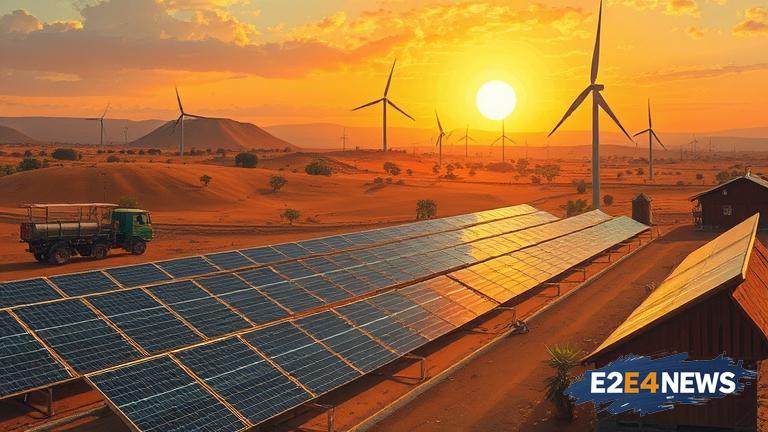The African continent is witnessing a significant shift towards renewable energy, driven by the need to address the pressing issues of energy access, energy security, and climate change. With many countries still struggling to provide electricity to their populations, renewable energy has emerged as a viable solution. Solar and wind power are becoming increasingly popular, with countries like South Africa, Morocco, and Egypt leading the way. The cost of renewable energy technologies has decreased dramatically over the years, making them more competitive with fossil fuels. This has led to a surge in investment in the sector, with many international companies and organizations committing to support Africa’s renewable energy ambitions. The African Union’s Agenda 2063 has set a target of ensuring access to clean and affordable energy for all Africans by 2030. To achieve this goal, the continent will need to increase its renewable energy capacity significantly. Several countries have already made significant progress in this regard, with Kenya, for example, generating over 70% of its electricity from renewable sources. The use of renewable energy is not only good for the environment, but it also has numerous economic benefits, including the creation of jobs and stimulation of local economies. In addition, renewable energy can help reduce dependence on imported fossil fuels, improving energy security and reducing the burden on foreign exchange reserves. However, despite the many benefits of renewable energy, there are still several challenges that need to be addressed, including the lack of infrastructure, limited access to financing, and the need for policy and regulatory frameworks that support the development of the sector. To overcome these challenges, African countries will need to work together, sharing knowledge, expertise, and resources to create a more favorable environment for renewable energy investment. International cooperation will also be crucial, with developed countries providing support and assistance to help Africa achieve its renewable energy goals. The private sector will also play a critical role, with companies investing in renewable energy projects and providing the necessary expertise and technology. As the demand for energy continues to grow, it is essential that African countries prioritize renewable energy, ensuring a sustainable and prosperous future for generations to come. The benefits of renewable energy are numerous, and it is imperative that the continent takes advantage of this opportunity to transform its energy sector. With the right policies, investments, and partnerships, Africa can become a leader in the global renewable energy market, creating a better future for its people and the environment. The time to act is now, and it is essential that African countries work together to harness the potential of renewable energy and create a more sustainable future. Renewable energy is not just a necessity, but an opportunity for Africa to take control of its energy future and create a better world for all. The continent has the potential to become a major player in the global renewable energy market, and it is essential that it takes advantage of this opportunity. By working together and prioritizing renewable energy, African countries can create a more sustainable, prosperous, and equitable future for all.
